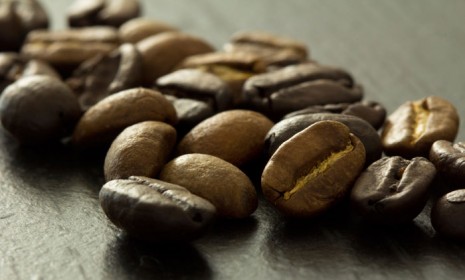Why the world may run out of Arabica coffee
Hint: Carbon emissions have something to do with it

A free daily email with the biggest news stories of the day – and the best features from TheWeek.com
You are now subscribed
Your newsletter sign-up was successful
Bad news for coffee aficionados: According to a study conducted by scientists at the United Kingdom's Royal Botanic Gardens, Kew, wild Arabica coffee could go the way of the dodo well before the turn of the century, thanks to a familiar culprit: Climate change.
In their simulation, researchers ran multiple computer models to forecast how wild Arabica would be affected under three different carbon emission scenarios. The team found that in the best-case scenario, wild yields of the flavorful beans would see reductions of 65 percent by 2080. In the worst-case scenario? As the world heats up, wild Arabica essentially wouldn't survive, reaching near extinction-levels — with a reduction of 99.7 percent — by 2080. That could be really bad news: Farm-grown Arabica provides about 70 percent of the world's coffee.
The Arabica coffee grown on commercial farms comes from a "very limited genetic stock," so as the world heats up, it may be difficult for these cultivated varieties to survive. That makes wild Arabic all the more important, as its genetic diversity could help shore up the shallow gene pool of commercially produced Arabica. Mat McDermott at TreeHugger explains:
The Week
Escape your echo chamber. Get the facts behind the news, plus analysis from multiple perspectives.

Sign up for The Week's Free Newsletters
From our morning news briefing to a weekly Good News Newsletter, get the best of The Week delivered directly to your inbox.
From our morning news briefing to a weekly Good News Newsletter, get the best of The Week delivered directly to your inbox.
If we're to continue growing, drinking, and exporting coffee — which is the second most-traded commodity in the world — then being able to exploit the genetic diversity of the wild stock, tapping into those varieties that are climate change hardy, is crucial.
Now, the objective of the study was not to provide "scaremonger predictions for the demise of Arabica in the wild," but to establish a "baseline from which we can more fully assess what actions are required," says Aaron Davis, Head of Coffee Research at the Royal Botanic Gardens, Kew. In other words, don't be alarmed. If scientists and farmers take action, there may just be hope for our caffeine-guzzling future yet.
A free daily email with the biggest news stories of the day – and the best features from TheWeek.com